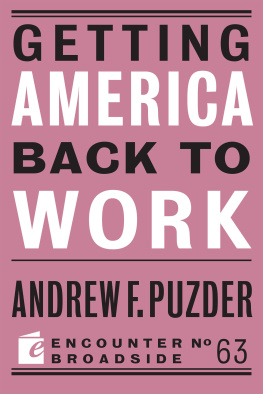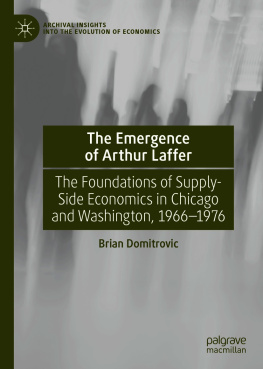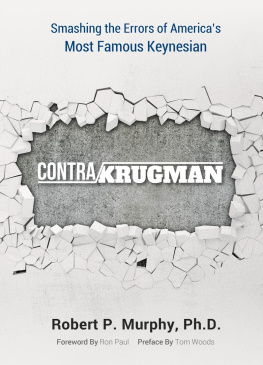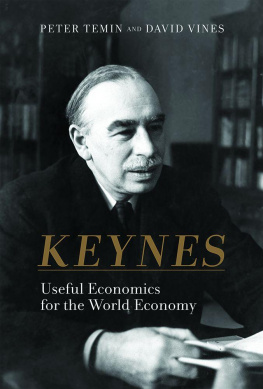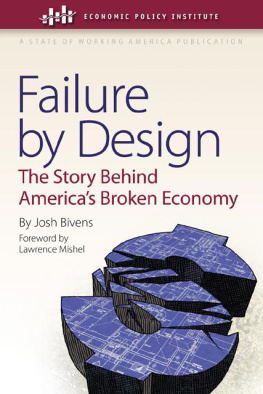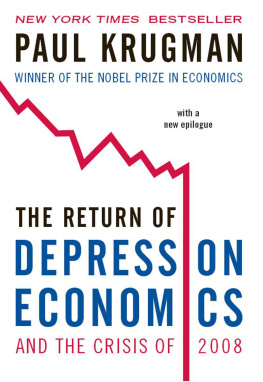
R ETURN TO P ROSPERITY
How America Can Regain Its
Economic Superpower Status
Arthur B. Laffer, Ph.D.
Stephen Moore


Threshold Editions
A Division of Simon & Schuster, Inc.
1230 Avenue of the Americas
New York, NY 10020
www.SimonandSchuster.com
Copyright 2010 by Arthur Laffer, Ph.D., and Stephen Moore
Excerpt from Economics as a Moral Science by Kenneth E. Boulding in The American Economic Review reprinted by permission of American Economic Association.
All rights reserved, including the right to reproduce this book or portions thereof in any form whatsoever. For information address Threshold Editions Subsidiary Rights Department, 1230 Avenue of the Americas, New York, NY 10020
First Threshold Editions hardcover edition February 2010
THRESHOLD EDITIONS and colophon are trademarks of Simon & Schuster, Inc.
For information about special discounts for bulk purchases, please contact Simon & Schuster Special Sales at 1-866-506-1949 or business@simonandschuster.com.
The Simon & Schuster Speakers Bureau can bring authors to your live event. For more information or to book an event contact the Simon & Schuster Speakers Bureau at 1-866-248-3049 or visit our website at www.simonspeakers.com .
Manufactured in the United States of America
10 9 8 7 6 5 4 3 2 1
Library of Congress Cataloging-in-Publication Data
Laffer, Arthur B.
Return to prosperity: how America can regain its economic superpower status / by Arthur B. Laffer and Stephen Moore
p. cm.
1. United StatesEconomic policy2009 2. United StatesEconomic conditions2009 3. United StatesForeign economic relations. I. Title.
HC106.84.L34 2010
330.973dc22 2009038255
ISBN 978-1-4391-5992-7
ISBN 978-1-4391-6938-4 (eBook)
To our friends who are no longer with us.
While we mention names in trepidation for fear of not
including someone we should have, we dedicate this to
Bill Steiger, Justin Dart, Fischer Black, Norman Ture,
Bob Bartley, Ronald Reagan, Jude Wanniski,
Milton Friedman, Bill Buckley, Jack Kemp, Bob Novak,
Irving Kristol, and all those who made the supply-side
movement possible.
C ONTENTS
R ETURN TO P ROSPERITY
INTRODUCTION
This book is all about the political economy in the old sense of the phrasea melding of economics and politics. Economics by itself has little meaning unless applied, and when applied by governments its always political.
Even though this book is by its very nature political, it will not be partisan. Good political economics is neither left wing nor right wing; its not liberal, its not conservative; and goodness knows its not Republican or Democrat; its just plain, straightforward economics. To a casual observer it would seem that practitioners of economics cover a broad spectrum of views and widely diverse fields. But economics is economics, and this book will always be strictly about economics and the application of basic economics through the political process. It is my belief that good economics always turns out, ultimately, to be good politics.
Barack Obama, the current president of the United States, represents an American success story as much as any person whom Ive ever seen. He is the essence of the melting pot that is America.
President Obama went to Occidental College, where he proved himself to be an extraordinary student and a bigger-than-life personality. Given the opportunity, Barack transferred to Columbia University, where his record was once again first-class. After graduating from Columbia University he attended Harvard Law School, where he became editor of the Harvard Law Review. A person becomes editor of the Harvard Law Review only because of excellence.
He then went on to teach at the University of Chicago, where I was on the faculty from 1967 to 1976 and taught for much of my academic life. I can assure you that only the very best and the very brightest are ever even considered for appointments at the University of Chicago. (Just kidding.)
Baracks political record speaks for itself. There is no higher achievement possible than being the president of the United States of America. He achieved all of this by the age of forty-seven.
His personal life is equally exceptional. If we were to go to central casting and ask for an American hero, Barack Obama would undoubtedly be one of the top five choices.
But that having been said, as shown by his economic policies, President Obama has adopted a view of economics that is as wrong in every single dimension as it can be. The mistakes that he and his administration are making are basic Econ 1 mistakes. These mistakes will not only doom his presidency, they will do enormous damage to the U.S. economy.
Good man, bad president.
Over the full span of my career I have spent a great deal of time directly and indirectly involved with government. My first stint in Washington, D.C., was during the years 1967 and 1968, when I worked at the Brookings Institution, a well-respected liberal think tank. I was appointed the chief economist of the newly formed Office of Management and Budget (OMB) in late 1970, under my mentor and OMB director George P. Schultz. My first official task was traveling to Japan, China, and Vietnam in Air Force II with both George Schultz and John Ehrlichman, then head of President Nixons domestic council. Thereafter I became integrally involved in the domestic economy of Vietnam and U.S. relations with China.
After returning to the University of Chicago in 1972 I stayed on as a personal consultant two days a week for George Schultz when he was secretary of the treasury, and later on with Casper Weinberger when he was secretary of health, education, and welfare, and William Simon when he was secretary of the treasury. After Nixons resignation and Gerald Fords ascendance to the presidency, I was a personal consultant to Donald Rumsfeld as chief of staff for the president, and his deputy Dick Cheney, and later on to Cheney as chief of staff, and Rumsfeld as secretary of defense.
My role with President Reagan was initially as an economic advisor in his campaigns of 1976 and 1980. In 1980 I was one of a handful of original members of Governor Reagans executive advisory committee, along with Justin Dart, Holmes Tuttle, William French Smith, Bill Wilson, Earl Jorgenson, Ben Biagini, Jack Wrather, Charles Zwick, Alfred Bloomingdale, Judy Israel, Ted Cummins, and others. I was the young kid on the block, if thats even conceivable now.
Later on I was a member of President Reagans Economic Policy Advisory Board for his full eight years in office. Then during the Clinton years, I was on the Congressional Policy Advisory Board, which consisted of some twenty-five people who advised the Republican congressional leadership at that time.
The reason I drag the reader through this tedious litany is to give weight to one generalization that in my opinion is critical to understanding policy-making in Washington, D.C., or anywhere else, for that matter: Whenever people make hasty decisions when panicked or drunk, the consequences are almost always ugly.
I do not believe there ever needed to be a stimulus program in 2008, or any spending package, for that matter, to save the economy. When Secretary Paulson went to Congress with a one-page piece of legislation allocating to him and him alone $700 billion, to spend as he chose, without any hearings, without any oversight whatsoever, I knew that our government had lost its senses. My view then and now is that Secretary Paulsons decision was a classic panic decision, and the consequences have been ugly.
Next page


